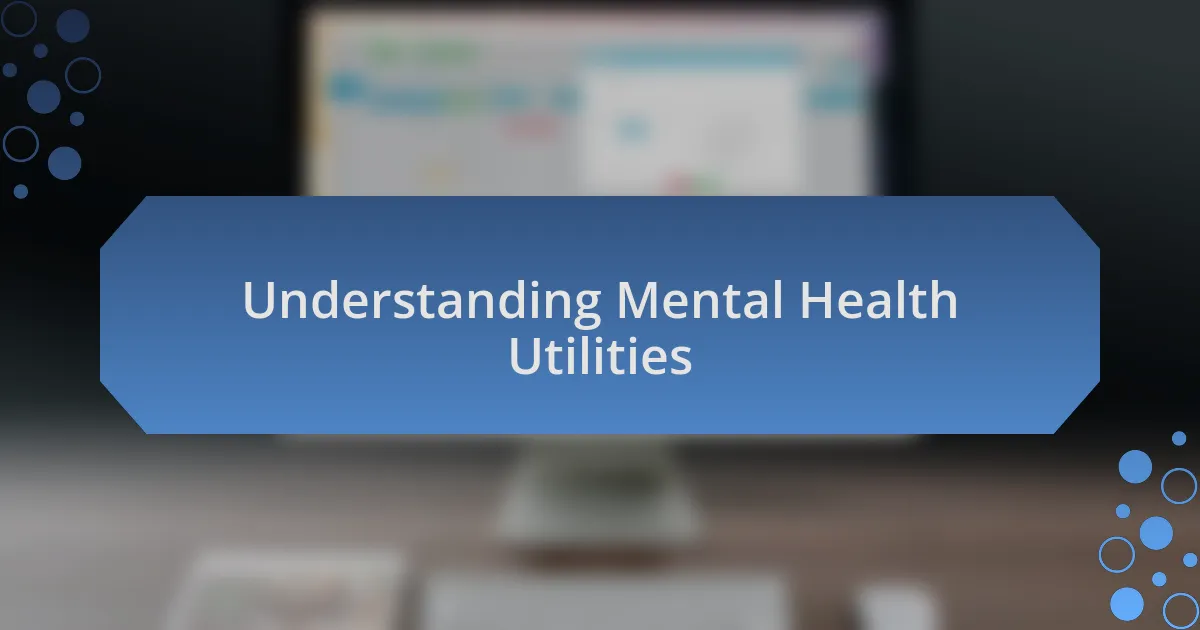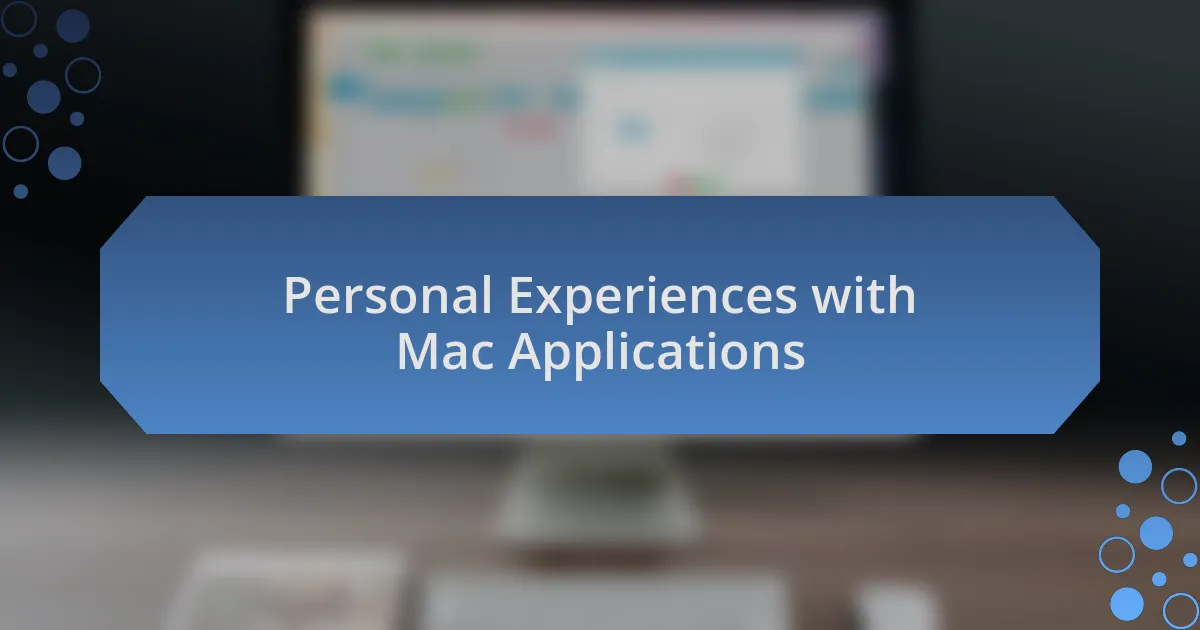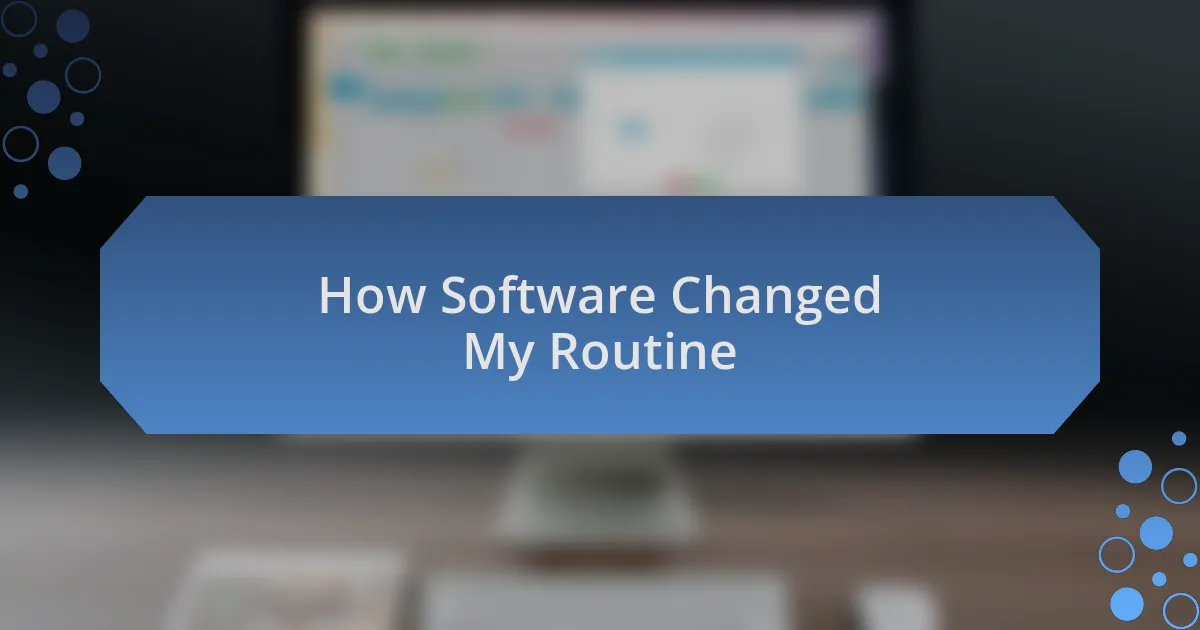Key takeaways:
- Mental health apps personalize care by offering tailored exercises, meditation, and mood tracking, making emotional support more accessible.
- User-friendly design and customization options enhance the user experience, allowing individuals to engage more deeply with the software.
- Integrating mental health apps with fitness trackers provides valuable insights into the relationship between physical and mental well-being.
- Routine management through reminders and habit tracking drastically improves self-care and helps maintain consistency in personal goals.

Understanding Mental Health Utilities
Mental health utilities, often referred to as apps, offer invaluable support in our journeys toward emotional well-being. I remember downloading my first mental health app out of sheer curiosity, not really knowing what to expect. But what struck me most was how this simple tool became a pivotal part of my daily routine, guiding me through moments of anxiety and stress.
As I explored these utilities, I began to realize their potential to personalize mental health care. Have you ever felt overwhelmed by your thoughts, unsure of how to cope? That’s where these apps shine, offering tailored exercises and resources that make it easier to manage emotions. For instance, I found guided meditation features that helped ground me, making a noticeable difference over time.
In a world where mental health resources can often feel distant or intimidating, these utilities serve as an accessible bridge. The ability to track moods or engage with cognitive behavioral therapy techniques on my phone gave me a sense of control I never thought possible. Isn’t it fascinating how technology can transform our approach to mental well-being, making care more immediate and intimate?

Overview of Mac Software Options
When considering Mac software options for mental health support, the variety available can be both exciting and overwhelming. I’ve often found myself spending quite a bit of time sifting through different applications, trying to find the right fit for my needs. Some software focuses on meditation, while others concentrate on mood tracking or therapy sessions. It’s fascinating how each app targets different aspects of mental wellness, catering to a wide range of preferences and goals.
For those who thrive on structure, I’ve come across applications like Daylio, which allows for daily mood tracking alongside journaling. I remember the first time I input my emotions after a long day; it was eye-opening to see the patterns emerge over time. Have you ever kept a mood journal? Seeing those entries build-up helped me pinpoint triggers and identify times when I needed to reach out for support.
In addition to mood and journaling apps, there are also programs tailored to specific techniques, like mindfulness or cognitive behavioral therapy (CBT). I found that having CBT tools, packaged conveniently in software like MoodTools, allowed me to practice coping strategies in real-time. This has made resources more approachable, eliminating that daunting feeling of walking into a therapist’s office. Isn’t it empowering to know that support is just a click away, especially on a platform we already use every day?

Key Features to Look For
When searching for mental health software, one of the key features I always consider is user-friendly design. I vividly recall using an app that was cluttered and complicated, making me more anxious than relieved. Does that sound familiar? A clean interface can significantly enhance the experience, allowing me to focus on my well-being rather than navigating confusing menus.
Another essential feature is customization options. I remember trying an app that let me tailor notifications based on my needs, which made a world of difference. It’s like having a personal coach who knows just when to check in with me. Having the ability to select reflections or meditation topics that resonate personally can create a deeper connection and commitment to the practice.
Additionally, integration with other health platforms is something I find invaluable. I often sync my mental health apps with fitness trackers to maintain a holistic view of my well-being. Have you tried tracking how your physical and mental health interact? The insights I gain from seeing my activity levels alongside my mood really empower me to make choices that enhance both.

Personal Experiences with Mac Applications
I have explored various Mac applications designed to support mental health, and one stood out to me for its simplicity and effectiveness. The first time I used it, I felt an immediate sense of relief as I could easily navigate to where I needed to go. Have you ever found yourself lost in a sea of features? That app reminded me that sometimes, less really is more when it comes to prioritizing our mental well-being.
Another memorable experience for me was with a journaling app that encouraged daily reflections. Each evening, I would sit in my favorite chair, allowing the day’s thoughts to flow onto the screen. I’ve discovered that this routine has really helped me process my emotions. Does writing resonate with you as a way to understand your feelings better? That connection between written words and mental clarity is something I’ve cherished throughout my journey.
I’ve also found great comfort in a mindfulness app rich with guided meditations. The first time I tried it, I was astonished by how much more centered I felt after just a few minutes. Have you ever tried to meditate and found it difficult to focus? For me, the calming voice guiding me through each session made all the difference. It’s these little moments that have created a deeper appreciation for how technology can play a supportive role in mental health.

How Software Changed My Routine
Using software to manage my routine has truly transformed my day-to-day life. One notable change was integrating a scheduling app that sends me gentle reminders about self-care tasks. Remembering to pause and breathe can slip my mind in busy moments, but with notifications popping up, I found it easier to carve out those crucial breaks. Have you ever overlooked your own needs during a hectic day?
Another significant adjustment came with habit-tracking software. This tool has encouraged me to stay consistent with my goals, whether it’s exercising or maintaining proper sleep patterns. The thrill of checking off each completed task has been surprisingly motivating. Do you find that a visual representation of your progress boosts your motivation as well?
Lastly, I started using a productivity app that helps me organize my thoughts and projects more effectively. In the past, I’d struggle with overwhelming to-do lists that seemed insurmountable. Now, breaking down tasks into smaller, manageable steps feels empowering. Can you relate to the relief of simplifying chaos into clarity? Adopting this software has changed my approach to challenges, making them feel far more achievable.